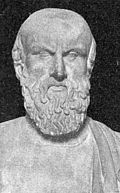You have /5 articles left.
Sign up for a free account or log in.

Aeschylus
Wikimedia Commons
As many humanities programs struggle to avoid cuts or face tough questions about job prospects for graduates, Washington University in St. Louis will launch a doctoral degree program this fall to cater to aspiring academics with interests in specific components of classical studies.
Classics department faculty members at Washington University say the program is intended to offer classics training with a twist that students can’t find elsewhere. And with two slots per year, the program won’t flood the already-tight job market with new Ph.D.-holders, said Timothy Moore, the department chair.
The university has long had a successful master’s degree program -- which will continue – in the classics, and with the addition of some new hires and new library resources acquired a couple years ago, the department started talking in 2012 about the future of its graduate program, said Moore, the John and Penelope Biggs Distinguished Professor of Classics.
The faculty recognized that there isn't a need for another generic classics program, Moore said. Instead, the new doctorate of philosophy in classics was designed based on its faculty members’ areas of expertise, with four focus tracks: ancient music, ancient theater, ancient philosophy and ancient history.
Each of the tracks will have interdisciplinary ties and input from professors in other departments. The theater one, for example, will include studying performance art and hands-on work with drama productions, said Moore, whose specialty is ancient music. Similar bridges will link the classics doctoral students with faculty in the music, history and philosophy departments.
The Society for Classical Studies lists 47 colleges in the U.S. that offer at least one doctoral degree in classical studies, plus six in Canada.
In his 15 years working with the society, Adam Blistein hasn’t seen many changes to that list. He’s the executive director of the society, which recently changed its name from the American Philological Association.
In that sense, Washington University’s new program was surprising, because new classics Ph.D. programs simply aren’t started very often, Blistein said. The most recent one he remembers began a couple of years ago, at Western University in Ontario. (It’s also been rare to see classics programs cut, Blistein said.)
Most people who enroll in classics Ph.D. programs do so with the goal of teaching at the university level, but there aren’t enough openings for everyone who finishes, so people do end up in other fields, Blistein said.
The classics society’s professional committee tracks the number of open positions listed in the field each year. In 2013-14, there were 191. Over the span of a decade, that number is up from a low of 138 in 2008-09, but still below the high of 221 in 2007-8. The percentage of those jobs that are tenured or tenure-track has also declined since the first half of the decade.
There were an estimated 1,000 students in doctoral classics programs in the fall of 2012, according to the 2012-13 Survey of Humanities Departments conducted by the American Association of Arts and Sciences.
Moore said the new program is intended to train academics, and to fill niche positions such as one Moore saw posted at Purdue University last year for a classics professor with a performance art focus.
Washington University didn’t launch this program blindly, without thinking about outcomes for graduates, he said. The classics remain essential to education, so it’s important to keep classics programs like Washington University’s alive, and that includes training new scholars, Moore said.
More broadly, the classics can offer us insight about ourselves while also teaching us about history. Moore points out that in 1968, Robert F. Kennedy quoted the Greek playwright Aeschylus when he spoke about learning from tragedy, even in the mist of despair. Kennedy gave the speech the day Martin Luther King, Jr. was killed.
Likewise, Moore’s students recently read Aeschylus' Oresteia. The trilogy revolves around long-term injustices and the cycle of violence. That text, Moore said, is especially meaningful at a like this, with the shooting of Michael Brown in Ferguson and the protest movements Brown’s death has sparked.
“The cultures of Greece and Rome are still so much with us and still have such power, that they deserve the resources required to maintain a careful and close study of them.”




